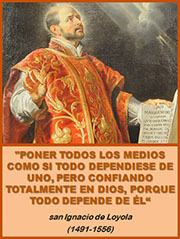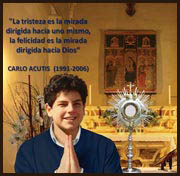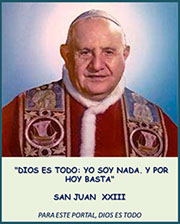



The role of the parish in the new evangelization
Very Rev. Robert Christian, O.P., Vicar Provincial of the Western Dominican Province
When Pope John Paul II appealed for a new evangelization to the Latin American bishops
gathered for the March, 1983, plenary session of CELAM at Port-au-Prince, Haiti, he coined an expression that implies the end of something old, the beginning of something
new, and the continuity of something transcendent. What is ending is a form of evangelization no longer adequate to the task of fostering an encounter between the Word and those who do not know how, or where, or why, to listen and reply to the Word. What is continuous is, of course, the Word who speaks, who invites all people to put their hearts and their treasure in things that are above (see Mt 6:21), who "becomes flesh" in the sacraments,1 and who empowers those who open their ears to die to sin and rise to life in God (Rm 6:11). What must be new, in the Pope's words, is the ardor, the methods, and the expressions the Church puts at the service of the eternal Word.2
The new evangelization must be distinguished from a "re"-evangelization.
Reevangelization presumes that little or no memory is left of the original evangelization.
People subject to reevangelization are not conditioned by education, culture, or the widespread presence of religious symbols to be initially responsive to the Gospel. An extreme case would be the Muslim populations in originally Christian North Africa. A less extreme case might arguably be those living in areas of Russia where the influence of the Church was most successfully limited.
Contrasted with reevangelization, new evangelization seeks to arrest and reverse any trend to dechristianization or alienation from the Word while the Church is still able to strike a responsive chord. A people in need of a new evangelization may not know how, where, or why to listen and reply to the Word. But they will have some idea of what (or Who) the Word is and why he is important.3 Many among such a people will be seeking him, and hence will be receptive to preachers both true and false.
In a parish, evangelization takes place on several levels. Initial evangelization occurs in initial catechesis and on first hearing the proclamation of the Word in the liturgy. Parish schools, CCD programs, RCIA programs, and preaching during worship are all venues of initial evangelization. A parish is also a place for ongoing evangelization – both in preaching and in more specialized educational milieux. But in the parish, the new evangelization is aimed at those who have fallen away or whose attentiveness to the
Word – as measured by their determination to live as disciples – is weak.
The subjects of new evangelization in a parish are usually those who have received the
sacraments of initiation and – perhaps at some point – reconciliation and matrimony, but
who have drifted away from the pew and the parish hall. These are people who cannot
easily be reached by traditional methods – as is evident in the Pope's call for new
methods in the new evangelization.
In our society, such people can be barraged by all sorts of media bearing a message tagged "Christian": radio and television shows, door-to-door proselytizers, news coverage, and entertainment programs. They can be skeptical of any overt challenge to their indifference, indolence, incomplete views, or mistaken beliefs about the Gospel.
Quite possibly, a priest could not "go to" them, and if he did, he might be rejected at the
start. New evangelization calls for new evangelizers, one's peers in the laity.
The message is timeless, but it needs fresh articulation, and a focus on the receptivity of
the audience. In a Dominican parish, the priests may well have the most intensive theological and philosophical formation, but they cannot "hear" themselves or the message the way lay people do, and in any case, they do not live and work alongside those who will not participate in parish life.
In a Dominican parish, the scientific competence of those trained in philosophy and
theology combines with a recognition of the Holy Spirit's operation in the souls of all the baptized and confirmed, to create a community of evangelizers each of whom needs to learn, to pray, and to articulate. Priests learn from the laity challenged to articulate the
faith in non-churchy places. Laity learn from Dominicans steeped in the tradition of St.
Thomas, who marvelously used the new learning of his day to present the faith.
All, moved to love God because they are ever exploring God's goodness, respond to
learning in prayer, and, moved by the experience of love in prayer, grow more curious to
know God's goodness. This cycle is Dominican contemplation. Some will find that they
are not called to be evangelizers, but their contemplation and intercession are directed
toward the fulfillment of the task of evangelization. Others will find that contemplation is
the sure basis of their effective evangelization, since only by knowing God and God's
people deeply and loving them intensely will they be moved to communicate and be
equipped with something to say that will be heard. "Contemplare, et contemplata aliis
tradere" (to contemplate, and to give to others what has been contemplated), Aquinas's
motto for the Order of Preachers, is the motto for the Dominican parish.
In a Dominican parish, while preaching in the liturgy holds pride of place, preaching
occurs in families, in business venues, at social occasions, and sometimes during casual
encounters, because the laity are formed to be contemplative, articulate, and thus,
courageous in proclaiming the faith. Awareness of one's limitations and doubts does not
inhibit those commissioned (by the Spirit, at Confirmation4) to preach. Rather, it spurs
them all the more to experience the Lord's forgiveness and revelation.
New evangelization is, thus, a new "gospel-ization" of those already disposed by Baptism
and some other formation to receive the Good News. Its proponents are those who
contemplate the Giver of all good gifts and who take it upon themselves to train for the
task given them by the Holy Spirit, who, ultimately, lets us not fear what to say (cf. Lk
12:11-12).
Portions of this article have been previously published in Seminarium by the Vatican
Congregation for Catholic Education, Anno XXXI, no. 1, pp. 118-119.
1Cf. Liam Walsh, O.P., "The Sacraments of Initiation" (London, 1988), 15.
2Acta Apostolicae Sedis 75 (1983), 778: "Nueva en su ardor, en sus metodos, en su expresion."
3Ibid., 774: "Un pueblo, por fortuna abierto al Absoluto de Dios y anhelante de respuestas de fe a las cuestiones que se pone sobre si mismo,
sobre la vida, el sufrimiento, la muerte, el mas alla."
4Cf. John Paul II, Encyclical Dominum et Vivificantem, no. 25.
Iglesiaehistoria.com | Querétaro, México | 2017
Todos los Derechos Reservados